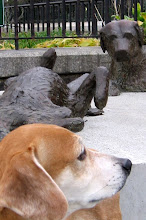Now for something potentially irrelevant: it's snowing, I've enjoyed more coffee even more than usual, and I've just set aside my morning newspaper's crossword. Why abandon one of my daily pleasures? Because the clue was "follow relentlessly" and the answer is "dog" -- not Canis familiaris, but a dog of another breed altogether.
So as I sneak up on the coffee pot yet again, I grab my biggest, fattest, heaviest single-volume dictionary, open it to "dog" and admire all those words. Not for the first time do I savor the etymologies and first known appearances. There are times, I guess, when I want to play with any dog, including the word itself.
In my ceaseless search for books about dogs, or books in which dogs appear in any context and to any degree, I often discover dogless books whose titles include some form of the word dog. So wide is that word's application that one could fashion an intriguing library of books with no real (or mythical or theoretical or metaphorical or in any other way caninely defined) dogs within but dog words on every cover. Is the word dog a well-tested marketing tool, perhaps? Does it tell us so many things, intellectually and emotionally, that there's just no end to our attraction to it?
How much dog does it take to make a dog book? How pervasive are dog words, in literature, in our daily conversation? Does our affection for dogs inspire us to use more dog words, and do we ever think twice about some of the less than flattering usages? Not every lapdog or watchdog is a quadruped. In the doghouse doesn't mean sweet Fido is having a nap but where we don't want to find ourselves, asleep or awake. Aching dogs are not paws but human feet. If you're dogged by worry, you might not be worrying about your dog. When you're the object of dogged pursuit, chances are it's not a dog who's on your trail. And it follows relentlessly, as today's paper reminds me, that no book's pages should be turned down, folded and creased to form the lamentable dog-ear. Turned down also means rejected, and a dog-eared page might feel demeaned as well as damaged. Imagine it whimpering, and you'll always use a respectable, acid-free bookmark.
Now back again to my coffee, the tumbling snow, and today's puzzle in The New York Times. Will I find another doggone dog clue?
Subscribe to:
Post Comments (Atom)

No comments:
Post a Comment